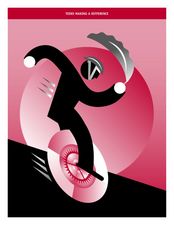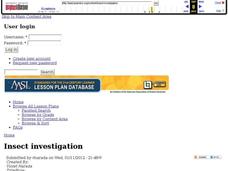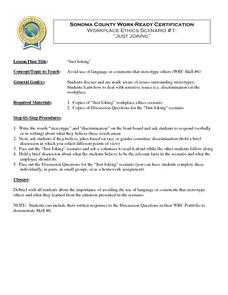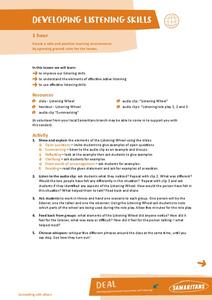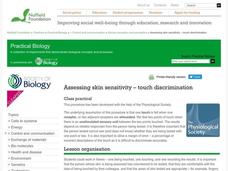Curated OER
Differing Federal Responses to the Great Depression: Letter Analysis
Young analysts examine two letters, one written by President Hoover and one written by FDR. Each letter contains that president's response to the role of the Federal Government during times of crisis (The Great Depression). They analyze...
Curated OER
Learning About America
Each slide has a grid to be filled in by a student or team. In order to have that spot active, the student must answer a question about the general history of America and national holidays correctly. There are 10 pages, and each has...
Curated OER
Teens Making a Difference
Is your opinion significant? Help your class discover the influence their opinions hold and encourage them to make a positive change in their community. To start, they get in teams and brainstorm why their school should have more healthy...
Curated OER
Evidence of Photosynthesis
Hands on science is the way to go! Learners conduct a lab experiment to help them explain how plants make food through photosynthesis. They test for the presence of starch in leaves using iodine solution and identify the basic things...
Curated OER
Insect Investigation
Investigation is a brilliant way to spark scientific inquiry. First graders will identify, research, and report what they have learned about a mysterious bug found on the playground. They will use multimedia resources for research and...
Curated OER
Using Bar Graphs to Understand Voting Patterns
Bar graphs are used as a way to study voting patterns in the United States. A variety of statistical data is presented in the graphs, and pupils must interpret the data in order to make a report to the class. Three excellent graphs,...
Curated OER
Student Opinion: What Teacher Do You Appreciate?
This online resource is composed of a writing sample about teacher appreciation and a writing prompt for learners. You could use this as an in-class journal activity or you could have class members post their responses on the New...
Curated OER
The Tempest: The K-W-H-L Strategy
What does your class want to know about William Shakespeare's The Tempest? Host a discussion about the questions high schoolers have about the play with a KWHL activity in which they write down their inquiries, what they...
World Wildlife Fund
Arctic Food Chain
Explore the food chains that support Arctic ecosystems. A class discussion on interdependence and the different roles plants and animals play in ecosystems provides students with the knowledge to complete a worksheet asking them to...
iCivics
The Fourth Branch: You!
Take time to remind your young learners of the valuable understanding that each branch of the United States government is really composed of other citizens. The reading material and worksheets of this resource cover the importance of...
iCivics
Government Spending
After discussing personal financing with your class, consider following up with this well-rounded introduction to government spending. The resource includes reading documents and worksheets, and covers topics as the federal deficit and...
My Career Space
Just Joking
After reading a workplace ethics scenario regarding an employee who makes racially insensitive comments, your learners will discuss how language that stereotypes others is discriminatory and never "just joking."
National Endowment for the Humanities
Albert Sabin and Bioethics: Testing at the Chillicothe Federal Reformatory
Do the ends justify the means? Getting a drug approved in the US is a long and involved process. But at some point out, it involves testing on humans. The ethics of such testing is the focus of a resource that uses Dr. Albert...
Apache
Gerunds and Infinitives
Learning proper grammar rules for a middle school student can be difficult, especially in a texting world, but this resource demonstrates how the verb changes by adding a gerund or infinitive. Keep up the texting, but use this to...
Houghton Mifflin Harcourt
Let’s Count!: Challenge Activities (Theme 5)
Challenge young scholars with a counting-themed series of activities. Your counters will write invitations to a feast, create books about dinner parties and animals, design posters, draw pictures of their favorite peaceful places,...
Curated OER
Inspire a Life of Reading
Making letters out of goop, sight word bingo, tic-tac-toe vowels. Download this packet loaded with activities designed to engage beginning readers. Although designed for adults, many of the activities are appropriate for any...
Samaritans
Developing Listening Skills
Being a good listener is key to building and maintaining positive relationships. Use this lesson as a way to help children connect with others by becoming active listeners and improving their listening skills.
National Wildlife Federation
Lights, Camera, Action! Conducting an Energy Audit
Thirty percent of energy used by schools is used inefficiently! Part two in the series of 12 has groups perform energy audits of their schools as part of the Cool Schools Challenge. Each group is assigned a specific room, performs the...
Berkeley Lab
Virtual Frog Dissection Kit
Fluffy is one of the most common names for a pet frog. Fluffy, the digitized frog in this dissection kit, opens up quite literally to allow scholars to see what's inside. The basic kit encourages pupils to click on various organs to see...
Carolina K-12
How Do I Pre-Register and Vote in North Carolina?
This practical activity helps young citizens learn about pre-registration to vote in elections, discuss the merits and flaws of the pre-registration process, and register themselves. The concluding activity has young voters creating...
Cornell University
Predicting Chemical Reactions
Prove the Law of Conservation of Mass through a lab investigation. A well-designed lesson asks groups to combine materials and monitor indicators for chemical reactions. Measuring the mass of the reactants and products allows individuals...
Nuffield Foundation
Assessing Skin Sensitivity—Touch Discrimination
How do we distinguish between the number of things touching our skin? Scholars explore an interesting lesson through an experiment. They learn that there must be an unstimulated sensory unit between two touches to distinguish them. They...
US Institute of Peace
Identifying Conflicts
When viewpoints collide, conflict arises. Can your pupils identify the components of conflict? The fourth in a series of 15 lessons about peacebuilding helps participants identify the underlying causes of conflict. Teams role play to...
Smithsonian Institution
World War I
How did World War I effect the United States' status as a world power? Pupils examine a website to learn many interesting facts about American involvement during World War I. They read passages and interact with artifacts in an online...




